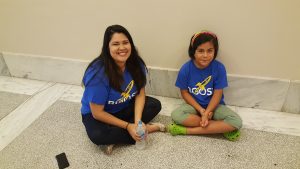Coaching, Mentoring, and Teaching Opportunities for Duke Graduate Students and Postdoctoral Fellows

You’ve made it – Now become a BOOST Science Coach and help inspire the next generation of physicians, engineers, and scientists from all walks of life!
BOOST needs role models and mentors who can help make science come to life for local elementary, middle, and high school students.
Build lifelong relationships as you watch these kids blossom.
Duke medical students, graduate students, science professional students, and postdoctoral fellows are in a unique position to share their experience and enthusiasm with elementary, middle, and high school students and to help spark these young people’s interest in science, technology and medicine.
Remember your first mentor? Now it’s your turn.
BOOST is seeking 20 Duke medical, engineering, graduate students and postdoctoral fellows to serve as Science Coaches and Teaching Associates. Preference is given to applicants with a passion for helping the next generation of scientists and doctors.
As a BOOST Science Coach, you can:
- Work with students in the classroom. Some coaches serve as Teaching Associates in local classrooms, working closely with a teacher and groups of students to teach and enhance the science curriculum. As a coach, you will get to share your research or area of expertise, lead or help facilitate experiential exercises, and encourage students’ science inquiries by helping with labs and other hands-on projects.
- Serve as individual mentors. Some BOOST Science Coaches become mentors, working closely with two students selected as “Science Scholars.” After orientation and training, you will meet with each student’s guidance counselor and/or teacher to learn about the student’s background, special needs, behaviors to avoid or encourage, and interests, and will be formally introduced to the students and their parents. Then, you and your team will work together to design and carry out an intensive research project. We hope that this opportunity will encourage some Science Scholars to participate (often for the first time) in activities such as the Student Academy of Science, Science Olympiad, and school science fairs.
- Head up a student research team. As a BOOST XL or XXL Science Coach, you will serve as a team leader for a group of four or five middle or high school students. Last year, for instance, the whole BOOST XL team studied dolphins and the small groups did research on sleep patterns, sensitivity to water changes, and designing education enrichment devices (“toys”) for dolphins. Most of the work is over two weekend trips (in this case the National Aquarium in Baltimore and the Duke Marine Lab) and two Saturday workshops.
Science Coaches participate in two orientation sessions to prepare for your new role. You will learn about the BOOST program’s goals and its place as part of an overarching strategy to increase diversity in the biomedical and technology professions, as well as information on the local science curriculum, academic goals for participating students, and strategies for engaging these students.
Regular, informal gatherings will provide opportunities for ongoing support and feedback, and will foster a community of those committed to nurturing younger students from underrepresented populations who can become the next generation of physicians, engineers and scientists.
Ready to become a Science Coach and change kids’ lives? Apply here.

